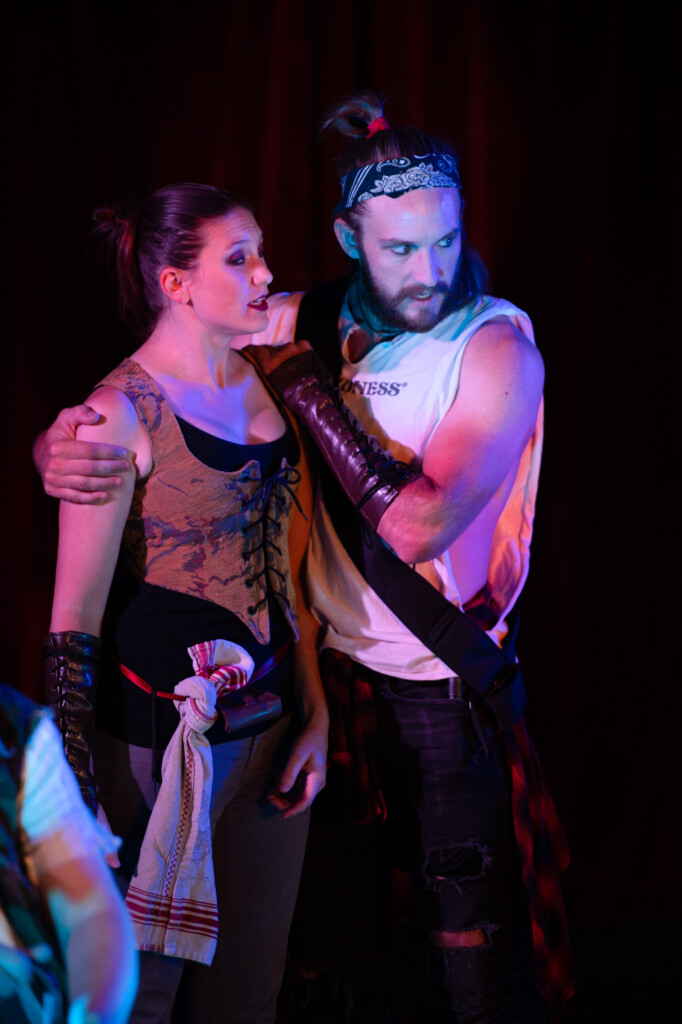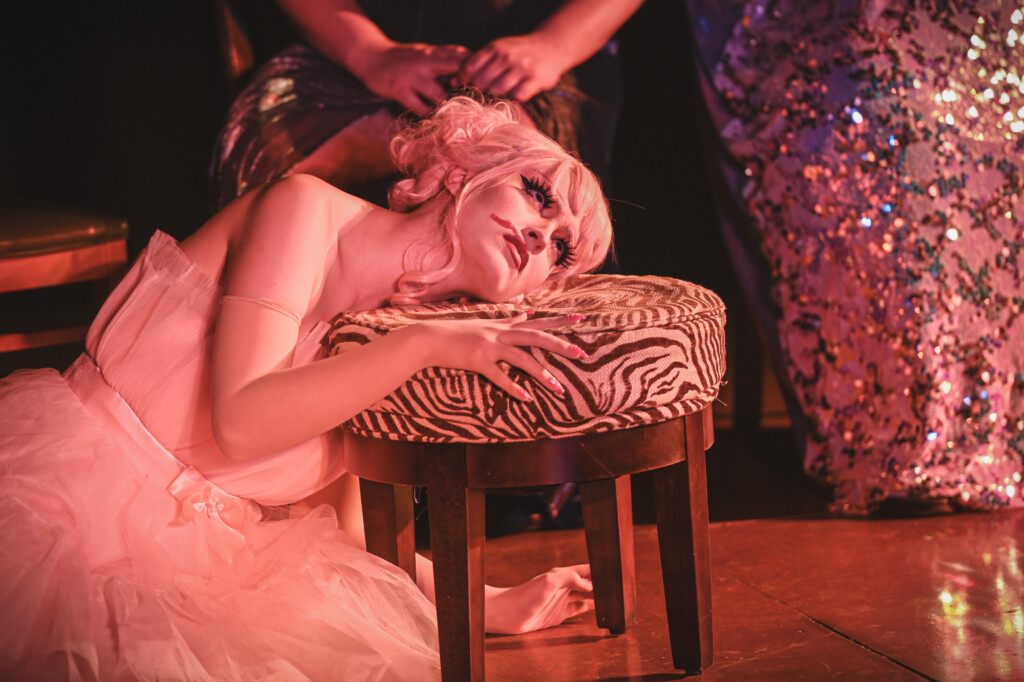With two dozen shows in four performing venues at The Gateway in downtown Salt Lake City, the Great Salt Lake Fringe (GSLF) returns for the eighth year, with shows spanning the two weekends from July 28 through Aug. 7. This is also the first year since 2019 that all shows will be in person. The festival was entirely online in 2020 and the 2021 edition was held in a combination of streaming video and live performance productions.
GSLF has proven effective as a launching pad for independent artists. This year’s slate as indicated below features new and veteran performers and ensembles from both Utah as well as out of state. As noted in prior years at The Utah Review, Fringe is a model of artistic equity in terms of treatment and access. All of the ticket sales revenue is paid out to each performer or group, based on their cumulative audience numbers. Because the Fringe model puts every performer on as equal a playing level as possible, it is up to the individual show creators and performers to promote and advertise their work. Many of this year’s performers already have spent several weeks on social media promoting their work, many of which will be seen for the first time by an audience. Jay Perry and Shianne Gray return as Fringe co-directors.
An opening day event will be held at The Gateway on July 28 at 6 p.m., at Hall Pass at the south end of The Gateway.
Among the shows is an encore run of Role Play by the locally based Immigrant Daughter’s Theatre, which premiered in 2021. As The Utah Review noted at last year’s Fringe, Immigrant Daughter’s Theatre is a marvelous new creative entrepreneurship for Salt Lake City. True to its name, it comprises both the literal and artistic dimensions of its principals: Ariana Farber, Brenda Hattingh and Morag Shepherd. Their inaugural production is gobsmackingly good: Farber’s Role Play.
Directed by Shepherd, the play is a two-hander enveloped in devilish, sexy entropy featuring Farber and Tyson Baker, in respective roles as an actor and playwright who engage in a clever, all-morality-be-damned approach to having an affair. The whole sense of abandon comes through on the stage from the awkward moments at the outset to the equally clumsy turmoil that temporarily interrupts the affair before it resumes with more impropriety than before. The rules of engagement, so to speak, are similar to what this anonymous contributor wrote in an essay for The Guardian in 2016, outlining how she kept her affair secret for nine years: “I want no drama disrupting my family. I want to stay happily married and carry on my affair and I never, ever want anyone else to know, so I have every detail planned and covered. My husband doesn’t suspect, my sisters and my best friends have no idea and I make sure there’s no evidence at all that can trip me up.”
Indeed, there is no room in this Fringe space for prim demeanor or self-righteous propriety. But, it also is a lesson about acknowledging the risks and the complexities of the realities of having such affairs, especially when the individuals involved overlap professionally. Nevertheless, both accept the godforsaken mess, to quote Taylor Swift’s Illicit Affair song. Or, Swift’s lines: “For you, I would ruin myself. A million little times.”
Many productions on the 2022 Fringe slate include budding independent theatrical enterprises. Small Box with a Revolver is about “two painfully polite and questionably intelligent strangers [who] wake up in a locked room with only a curious box in the middle of the room to guide them. Dustin Hageland wrote the play, which is directed and performed by Stephanie Stroud and David Knoell.
From the Provo An Other Theater Company, Somethin’ to Cry About, created by Shelby Noelle Gist and Dorsey Williams, concerns a young Black talented man who shows up for his regular session with a white therapist. From Speakeasy Theatre Company, TRIP is described as a “modern morality play” by Cordelia Brand, which highlights a fall campaign trip when a woman finds herself in a “stand-off with Death.l
One of the productions from out of state is #CHAMPION, is a “one person, one skeleton show of queer disabled survival,” presented by Amuse Bouche Productions, which is known for multidisciplinary work that is movement/dance-based and centers the experience of queer, disabled creators and performers, who have presented shows in New York City, Miami, Detroit,and Denver.
SPAN (the acronym for Skyline Performing Arts Nexus) will premiere Can I Have Five Dollars? and Other Tales From an Underachieving Former Gifted Child, a blended genre collection of miniature plays that explore what it means to “belong.”
Veteran actor Sarah Shippobotham, who is well known in the Utah performing arts scene, will present Can I Say Yes to that Dress?. A one-actor show, it is set in a wedding dress changing room, where “a middle-aged woman questions her life choices and what it means to be a woman,” infusing comedy and Shakespearean references. Shippobotham also appears in the stellar new production SLACabaret: Down the Rabbit Hole, being presented this summer at the Salt Lake Acting Company.
With You, written by Jamie Wilcox, follows three friends over the course of two years from the early 2000s in Salt Lake City and explores various themes of overlapping relationships as well as self-harm and suicide.
Fringe always makes for an ideal creative laboratory to bench test concepts for format and performance. Clown House is a new experimental theater piece presented by Beyond the Line Theatre Company, a project-based ensemble in Salt Lake City, Utah. Method: Legends is “about taking the audience to unfamiliar places, to tell stories we all know but have never heard before. A new take on storytelling, this show combines many modes of performance with a dynamic set style to create a completely unique experience for the audience with every show. Compositions of music, movement, color, lighting, and poetry layer to create dreamlike sequences of abstraction in this one-of-a-kind theatrical exercise.”
Wasatch Theatre Company returns to Fringe with its second edition of Forbidden Utah, this time with the theme of Unmasked. Last year’s inaugural edition was a cabaret show of song-and-dance parodies that spoofed the Utah theatrical scene along with some of the state’s politics. The best moment of that production was the satirical send-up of Utah Governor Spencer Cox’s handling of the drought and pandemic, with Hey, Big Spencer, based on Sweet Charity’s Big Spender.
Fringe also is a popular venue for contemporary takes on some of theater’s most significant and popular pieces. @ll times, all things, all places, presented by Network Theatre Co., is based on Henrik Ibsen’s A Doll’s House. This time, Nora Helmer is cast as the Mormon housewife, who struggles with the sociocultural demands of perfectionism. Scaffold Theatre presents a fresh take on Antigone. The company is known for staging classical works in a modern, minimalistic setting, as a way of making them more accessible to the contemporary theater goer. Grassroots Shakespeare Company offers a queer twist on the Shakespearean comedy Much Ado About Nothing.
Comedy is a popular genre for Fringe. Just 3 Freaking’ Guys highlights the stand-up comedy chops of EK Kepoo, who will be joined by local comics Chuck Fury and Spencer Riley. Andrew Frank, a comic from the Pacific Northwest, returns to GSLF for a second year, this time with the multimedia show Monkey Sermon. Last year, his show, Ecstatic Blasphemy, was an entertaining peroration about who really are the perpetrators of blasphemy.
Various Fringe shows deal with dimensions of art as a vehicle for dealing with trauma and for the purposes of mental health. Travis Brady uses slam poetry in Look Me in the Mind. Seen and Heard Productions, a woman-led Utah production company, will present Mandela Mentality Method, in which, as the show’s producers describe, is set in a “post-modern, near future [that] brings forth Impressions, Inc., which allows its customers the opportunity to replace a memory from their childhood with a less traumatic or negative interpretation of events.” Placebo, featuring films, ideas and tips from the world of mental health, is described by its producers, Mental Healthy F.i.T., as “a TEDtalk in a haunted house.”
Tami Anderson will premiere Watch Me Disappear, about a woman haunted by the childhood memory of a neighbor who sexually abused her and is spiraling out of control in her behavior, which will certainly harm her. The Gateway-based performance space The Box, which is owned by Wasatch Theatre Company but has its own creative team, will present two shows. One is Monologues from a Movement, created by Amanda Caraway and Cami Rozanas, who collected from women across Utah as “a testament to the strength and resiliency of women who undergo harassment, discrimination, and assault in places that ought to be safe.” The second is The Haunting is You, which its creator R.J. Walker, an award winning spoken word poet well known to Utah audiences, describes as “an interactive horror/comedy where the audience is the ghost, controlling the terror inflicted upon the characters. Will anyone make it out of the haunted theatre alive?”
Opera even has found its way into Fringe this year. The Combat is based on the work of Italian composer Claudio Monteverdi, who was important bridge between the Renaissance and Baroque developments in music. Adapted by David Campbell, the work is performed using acoustic and electronic instruments in a modernized score. The work is made possible by the locally based Opera Contempo in co-production with NEXT Ensemble.
Fringe attendees should also look for discounts and special offers within The Gateway that will be presented in conjunction with the festival. Fringe organizers have indicated that masks are recommended and strongly encouraged for all indoor events. Tickets are available for singles shows or as a package of three or ten shows. For information about performance schedules and tickets, see the GSLF website.







